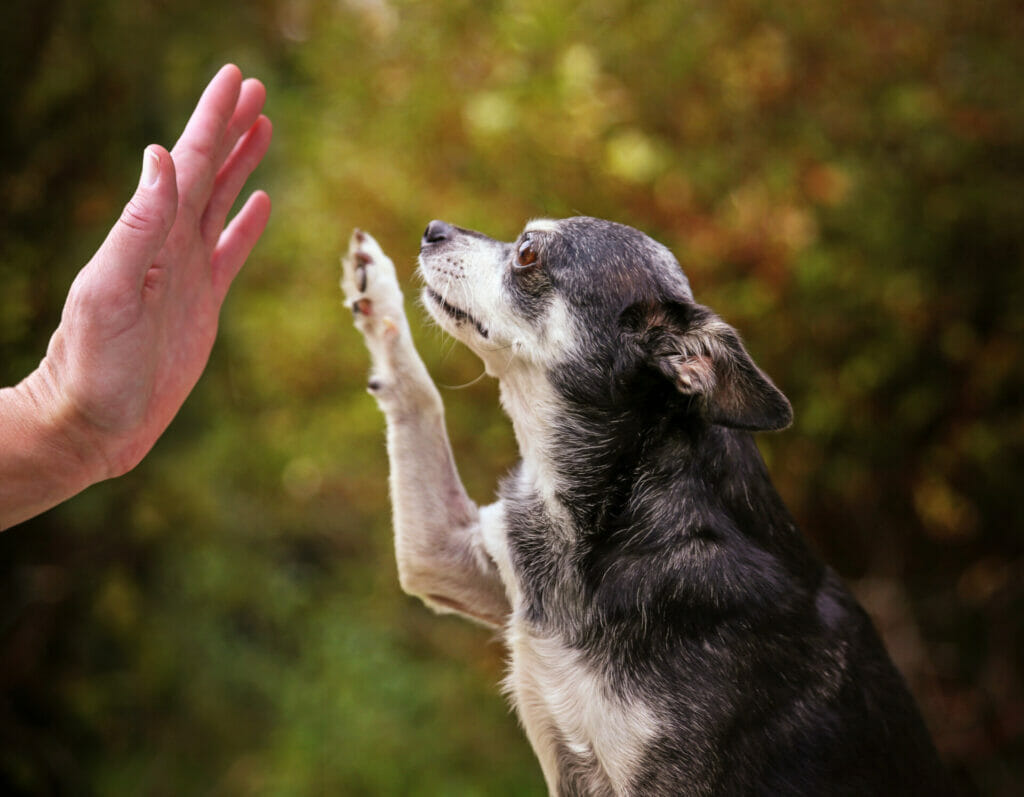One of the significant challenges of having a senior dog is when your dog’s health begins to change or their temperament seems different. Some personality changes occur naturally as a dog ages.
For example, as young puppies, most dogs are very social with dogs and people, but as dog’s age, many will become much more reserved and selective. Individual temperament, genetics, breed characteristics, and lived experience will also contribute to these changes. As dogs become seniors, some of their behaviors may shift, like people can have temperament changes as they age. If your senior dog is acting differently, it can be hard to know if it’s a behavioral issue or if there is something medically wrong.
Common challenges with senior dogs
Some of the most common changes people witness with their senior dogs can have a variety of underlying causes. Many of the most common temperament shifts we see with senior dogs could have either a medical component or a behavioral cause. These common temperament changes include:
Barking more
This may indicate your dog is uncomfortable or in pain. On the other hand, your dog could be experiencing signs of cognitive dysfunction or dementia. New and excessive barking can also be a behavioral issue resulting from your dog being bored or under-stimulated.
Changes in sleep routines
As they age, many dogs will naturally begin spending more time sleeping than they did in the prime of their life as part of their natural behavior. However, changes in sleep patterns can also be a symptom of underlying health conditions. Other senior dogs become restless as they age and may struggle to find a comfortable place to sleep or seem to struggle with staying asleep.

Potty accidents in the house
Has your senior dog started going potty in the house? This could be a medical issue that needs to be explored. It could be that your dog is experiencing a urinary tract infection or other new or chronic condition. Your senior dog could also struggle to “hold it” as long as it used to. Like puppies, seniors generally need more trips outside to go potty than adult dogs.
Shifts in activity levels or interest in play
As they age, your senior dog may start slowing down. They may have less interest in active games like fetch and seem less interested in going for walks. While this may be a natural behavioral development connected to aging, it also can be a sign of pain from arthritis or another medical condition. If your dog is in pain, it will generally be less interested in play and exercise. If you notice any changes in your dog’s energy levels, consult your dog’s veterinarian for a complete examination.

Fear of familiar people
Are you wondering if your dog knows who you are anymore? This can be a very frustrating and upsetting situation for dog owners. If your dog seems confused or seems to have forgotten people they once knew, these are symptoms that should be communicated to your dog’s veterinarian right away and could be a sign of canine dementia or other health issues.
Forgetting things
Dog owners can get frustrated that their senior dog needs to be paying attention to their cues or seems to have forgotten behaviors they once knew well. If you haven’t practiced a cue or skill in a while, it’s possible your dog has forgotten and needs to relearn the behavior. On the other hand, this forgetting could also result in your dog experiencing a change in cognitive function.
How to know what’s going on with your senior dog?
Unfortunately, there isn’t a straightforward way for dog owners at home to know if the changes they are seeing in your dog are because of behavioral or medical reasons. This is why it’s essential to make sure your dog is seen by their veterinarian regularly for a complete examination.
If you notice changes in how your dog is moving, acting, or engaging with you and others, it’s best to schedule an additional appointment with your dog’s veterinarian. Your vet will be able to let you know if the changes you are seeing with your dog are medical or behavioral.
Get support
In addition to working closely with your dog’s vet as they age, if you are experiencing challenges with your dog, it can be helpful to work with a qualified dog trainer who utilizes positive reinforcement training approaches.
You absolutely can teach an old dog new tricks, and a dog trainer can not only help you to teach your dog new skills, but a trainer can also support you with a better understanding of what your senior dog is trying to communicate with you. A trainer can support you and your senior dog with changes in the home, such as adjusting to new pets or family members, and support you with making sure your senior dog’s enrichment and behavioral needs are being met.




















